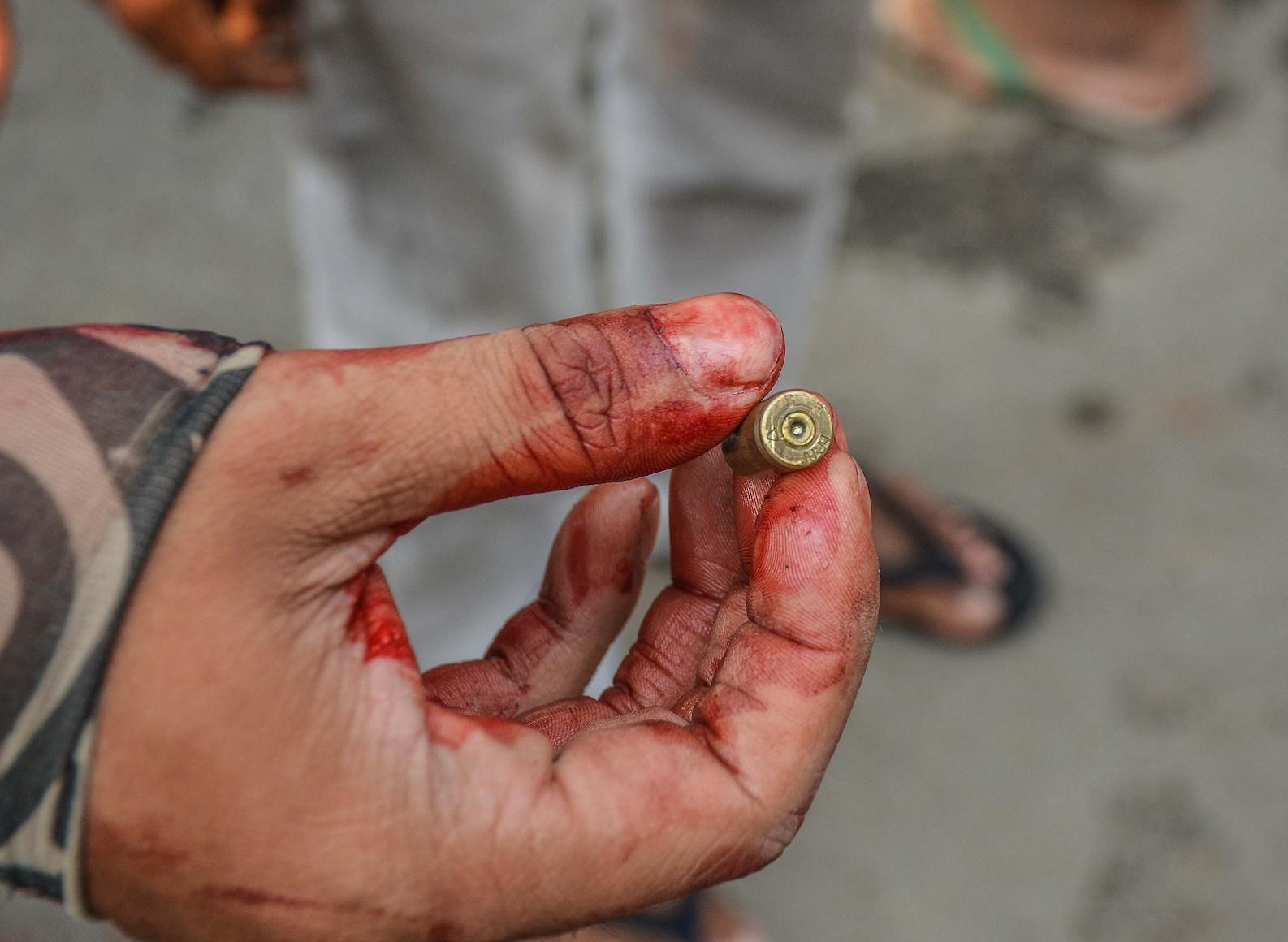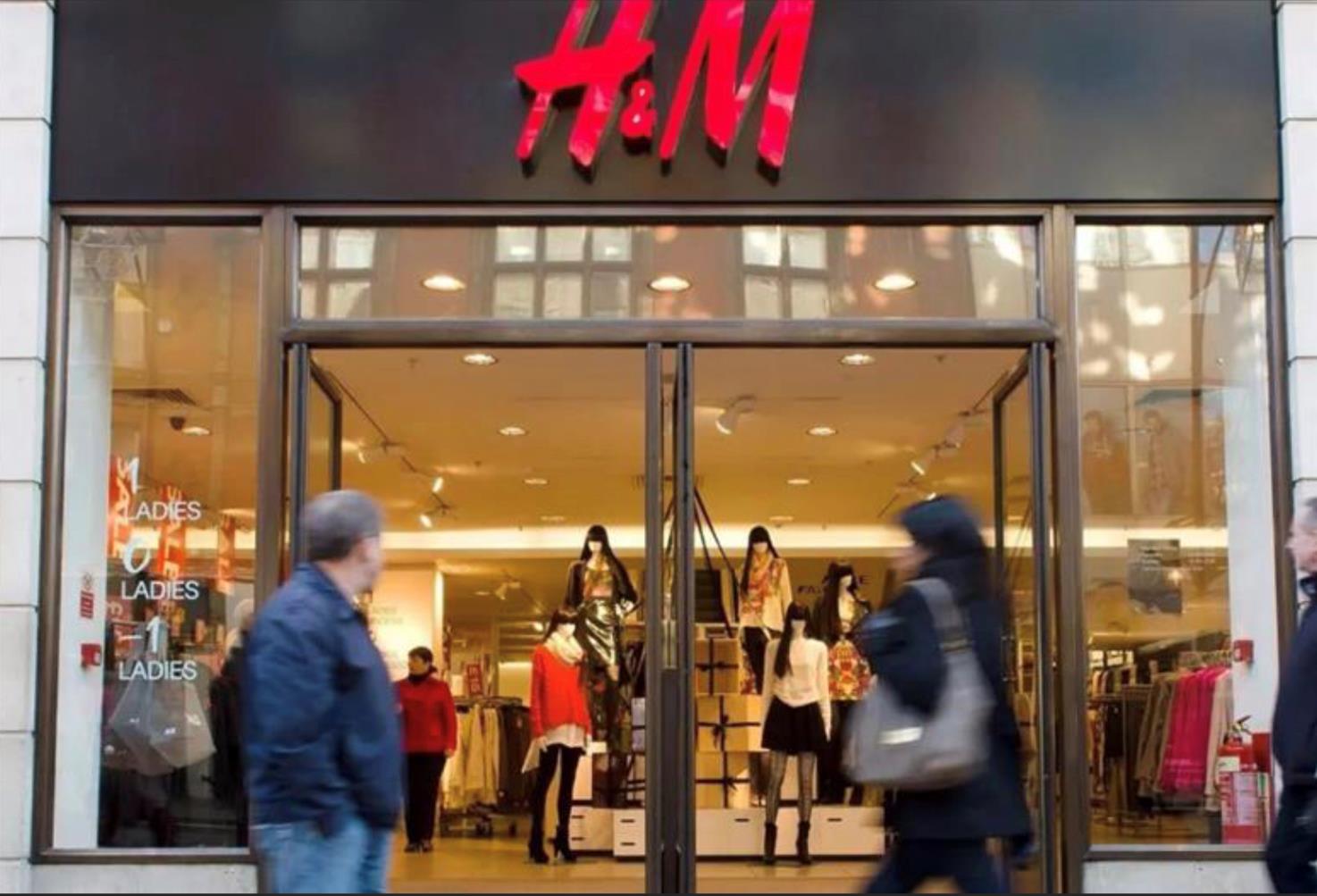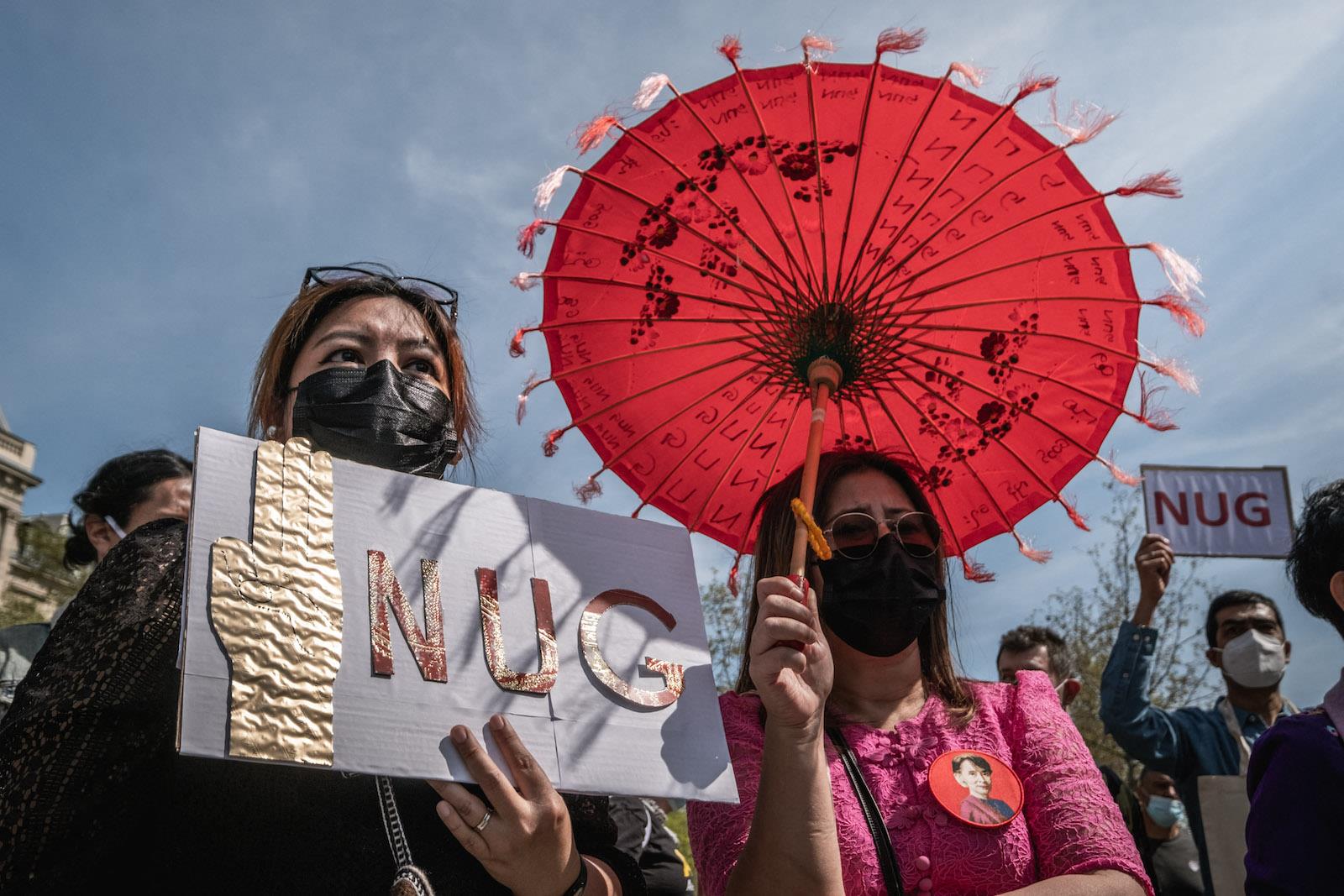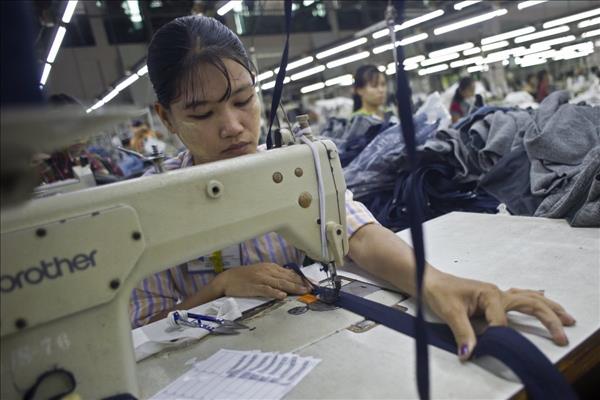
EU Talks Tough But Goes Soft On Myanmar Trade
The European Union is preparing to impose a new tranche of sanctions against Myanmar's democracy-suspending, coup-installed military regime, but behind the new measures, a debate rages about whether Brussels should revoke the benighted nation's EU trade privileges.
In particular, many European and Myanmar trade unions are calling for Myanmar's suspension from the Everything But Arms (EBA) trade scheme, which grants certain export goods tariff- and quota-free entry to European markets.
On the other side, many within the EU as well as global commentators have argued an EBA suspension would mainly impact already vulnerable female workers in the country's export-oriented garment sector – and not meaningfully hit the military junta's revenue streams.
On February 11, 2021, days after the military staged its coup, ousting the elected National League for Democracy-led government, the European Parliament passed a resolution calling for an investigation into whether Myanmar should lose its EBA privileges.
“The coup reversed the progress made during the democratization process, thereby undermining the conditions for granting EBA references,” the EU Parliament said in a resolution last October. EU parliamentarians this month asked the European Commission, the executive, asked for a decision on Myanmar's EBA status.
The EU reinstated Myanmar into its privileged trade scheme in 2013 during the quasi-democratic government of ex-military general Thein Sein.
In 2016, in response to the country's democratic progress, the US restored much of Myanmar's trade benefits that had been suspended for chronic abuses under direct military rule.
With greater access to Western markets, Myanmar's garment exports increased five-fold from 2012 to 2019. They were worth US$5.02 billion in 2019, representing around a third of Myanmar's total export value that year. The EU was the largest purchaser of Myanmar-made apparel before Covid-19.
So far, however, the European Commission has delayed deciding on whether to suspend Myanmar's EBA privileges. That's despite the general's abuses and a spreading civil war sparked by their coup.
More than 2,000 civilians have been killed by junta forces, 14,000 have been arrested and more than 700,000 displaced, according to a June statement by Tom Andrews, the UN Special Rapporteur on the situation of human rights in Myanmar.

A protester shows a bullet during a protest against military coup and detention of elected government members in Mandalay, Myanmar on March 27, 2021. Stringer / Anadolu Agency via AFP
“There is no indication, so far, that the EBA would feed the treasury of the military. Rather, it seems to keep jobs in the garment industry mainly for women in very precarious situations,” Heidi Hautala, vice president of the European Parliament, told Asia Times. “If this changes, the commission should move towards suspension of the benefits,” she added.
According to Georg Bauer, a PhD candidate in the history of human rights and democracy at the University of Vienna, while many garment sector jobs have already been lost because of Covid-19 and the coup, there is still a substantial number, around 200,000, of mainly poor women from the countryside employed in the sector.
Many have shown their support or engagement with the anti-junta Civil Disobedience Movement, which has staged periodic street actions and strikes since the coup, Bauer notes.
In its July economic update, the World Bank found that 4.9% of all“main workers” of a household were employed in Myanmar's manufacturing sectors before the February 2021 coup. That percentage had increased to 6.2% by May 2022.
“While working conditions have certainly worsened even in factories producing for the EU, which usually have some better standards than those producing for the Asian market, these workers still depend on this income,” Bauer said.
The EU isn't the only body weighing up this predicament. The Financial Action Task Force (FATF), an intergovernmental organization established by the G7 to fight money laundering worldwide, is currently debating whether to put Myanmar alongside North Korea and Iran on its anti-money laundering blacklist.
Analysts reckon the Paris-based FATF will likely make the designation next month, which would impact not just Myanmar's military-aligned businesses but also all companies based in the country that trade internationally.
A survey of 400 garment sector workers conducted last year by the Workers' Solidarity League of Burma, a nonprofit organization, found that 97% did not support campaigns for broader sanctions against the country's apparel sector.
The EU has claimed there are around 500,000 workers in Myanmar's manufacturing sector, but some analysts question the figure. The sector has been hit by massive job losses – around 220,000 in the 12 months following the coup, according to the International Labor Organization – but it remains a dominant sector in the Myanmar economy.
The World Bank's latest economic monitor update, released in July, found that“garment manufacturers – mainly reliant on external demand – appear to be recovering relatively strongly, as demonstrated by the ongoing expansion in manufactured exports since mid-2021.”
“The manufacturing and construction sectors are driving most of the modest growth expected this year,” it added.“Surveys conducted in 2022 indicate that manufacturing firms are operating at a significantly higher capacity than in 2021.”

Garment workers at a factory in the Shwe Pyi Thar industrial zone in Yangon. Photo: AFP / Ye Aung Thu
Manufacturing exports increased by 54% in the first half of 2022, compared to the same period last year, and were up by 10% compared to the same period in 2019, the report stated.“More disaggregated data indicates that garment exports have driven the overall increase in manufacturing exports.”
While this isn't necessarily filling the junta's coffers, especially compared to the money it would have made from the Western-sanctioned state-run energy firms, taxes collected from garment sector exports are still contributing to the regime's dwindling revenues.
Tax revenues, which usually account for around 30% of Myanmar's state revenues, fell from 6.5% to 4.9% of GDP between the 2020 and 2021 financial years. In part, that's because tax compliance has collapsed since the coup. In March, around 69% of firms surveyed by the World Bank said they had not paid taxes in the previous three months.
Tax compliance is highest among firms in the food and beverage sectors – in which between 36-38% of firms reported paying taxes – and followed closely by manufacturing at 36%, the World Bank found.
Although it rarely says so publicly, the EU is also concerned that the suspension of Myanmar's EBA status could precipitate Chinese or military takeovers of those local industries that benefit most from trading with Europe, Asia Times has been told by anonymous, well-placed sources.
Shi Kun, president of the Chinese Textile & Garment Association in Myanmar, recently told Caixin, a privately-run news portal dedicated to China news, that 70% of garment factories in Myanmar are Chinese-funded.
Brussels' EBA scheme, as well as its broader Generalized Scheme of Preferences (GSP), is designed to help developing countries alleviate poverty and create jobs while pushing them to uphold certain principles including labor and human rights.
Currently, trade unions are banned and 301 union leaders have been arrested and 55 killed, said Luc Triangle, general secretary of industriAll European Trade Union, which is among those groups calling for Myanmar's EBA privileges to be suspended.“Evidently, core ILO conventions are not being met,” he told Asia Times.
Production activities in sectors that benefit from the EBA, such as the garment sector, do not fall under the principle of“do no harm,” Triangle noted. “In fact, real harm is being done by these very activities providing income and foreign exchange to the regime,” he said.
“Trade union rights are human rights and they currently do not exist in Myanmar,” Triangle added.“By removing Myanmar's trade preferences under EBA, the EU can take non-violent action against the terrible regime. Until a new democratic government is in power, workers and trade unions remain unsafe.”
However, he added, it will be essential to limit the impact on workers, especially those in the garments sector who are mostly female and poorly paid.
The global brand H&M, for example, closed all its stores in Russia within days of Moscow's invasion of Ukraine in February this year. However, it is still sourcing goods from Myanmar.

H&M is still sourcing garments from Myanmar. Photo: WeChat
In 2017, Brussels warned Myanmar that it could lose its EBA trade privileges over the military-led“genocide” of its Muslim Rohingya population. Brussels finally opted against the move due to concerns penalizing garment sector workers would only increase resentment of the Rohingya among the general public, analysts say.
The EU has cut EBA privileges for other Southeast Asian countries for much less than genocide and military coups. Nearby Cambodia partially lost its EBA privileges in 2020 following a year-long investigation by the EU over the considerable deterioration of democracy and human rights in the country.
Around a quarter of Cambodian exports lost their tariff- and quota-free access to European markets as a result. The same week as Cambodia's lost some EBA privileges, the EU signed off on a vast free-trade agreement with Vietnam, a formally one-party communist state and by far a worse abuser of human rights.
Phnom Penh complained of double standards over the move and has noted that Myanmar, despite a military coup and now a brutal civil war, still hasn't lost its EBA trade privileges with the EU.
In one sense, however, the debate about Myanmar's EBA privileges is becoming increasingly redundant.
In March, the ILO established a Commission of Inquiry into the decline of workers' rights in Myanmar. The Ethical Trading Initiative (ETI), an international alliance of companies, trade unions and NGOs, commissioned its own report in May.
A report by Due Diligence Design, a consultancy commissioned by ETI, was published on September 12 and found that it's become impossible for global brands to conduct due diligence in Myanmar and adhere to globally recognized responsible business standards.
“The assessment provides evidence that these standards are not being met in Myanmar's garment sector and that it is not possible for businesses to apply normal human rights due diligence,” ETI said in a statement.
It advised:“Should companies choose to exit Myanmar they must do so responsibly, and in consultation with social partners. The impact of exiting Myanmar on workers and their families needs to be a clear focus in this consultation.”
Primark, the Irish fashion giant, announced this month that it will“begin working towards a responsible exit from the country” in light of the ETI report.
Other international brands are likely to follow, some analysts suspect. As the conditions now are“getting really bad in Myanmar and companies cannot manage to source in Myanmar responsibly”, many are going to pull out of the country, says Kristina Kironska, a Bratislava-based academic who specializes in Myanmar.
Instead of lifting Myanmar's EBA privileges, the EU needs to take even bolder decisions, some say. Asia Times understands the EU is preparing a new round of sanctions against the junta and its associated businesses. Its last tranche of sanctions was imposed in February, on the one-year anniversary of the coup.

Myanmar supporters of the National Unity Government the junta regime has declared a 'terrorist' organization. Image: Maxime Gruss / Hans Lucas via AFP
Justice For Myanmar, a campaign group, called on the EU in September to sanction 31 companies with alleged ties to the military's procurement of arms. Some of these businesses have already been sanctioned by the US, Britain or Canada.
Others are demanding that the EU takes the even more radical step of recognizing the shadow National Unity Government (NUG) as the legitimate government of Myanmar and step up financial support for the NUG's“people's war” against the junta.
“The negative impact of a withdrawal of EBA would be greater on the Revolution than on the junta,” said Bauer.“Instead of demanding such questionable punitive measures, we should therefore focus on advocating for active, positive support for the Revolution, where no such calculation even has to be made.”
Follow David Hutt on Twitter at

Legal Disclaimer:
MENAFN provides the
information “as is” without warranty of any kind. We do not accept
any responsibility or liability for the accuracy, content, images,
videos, licenses, completeness, legality, or reliability of the information
contained in this article. If you have any complaints or copyright
issues related to this article, kindly contact the provider above.

















Comments
No comment